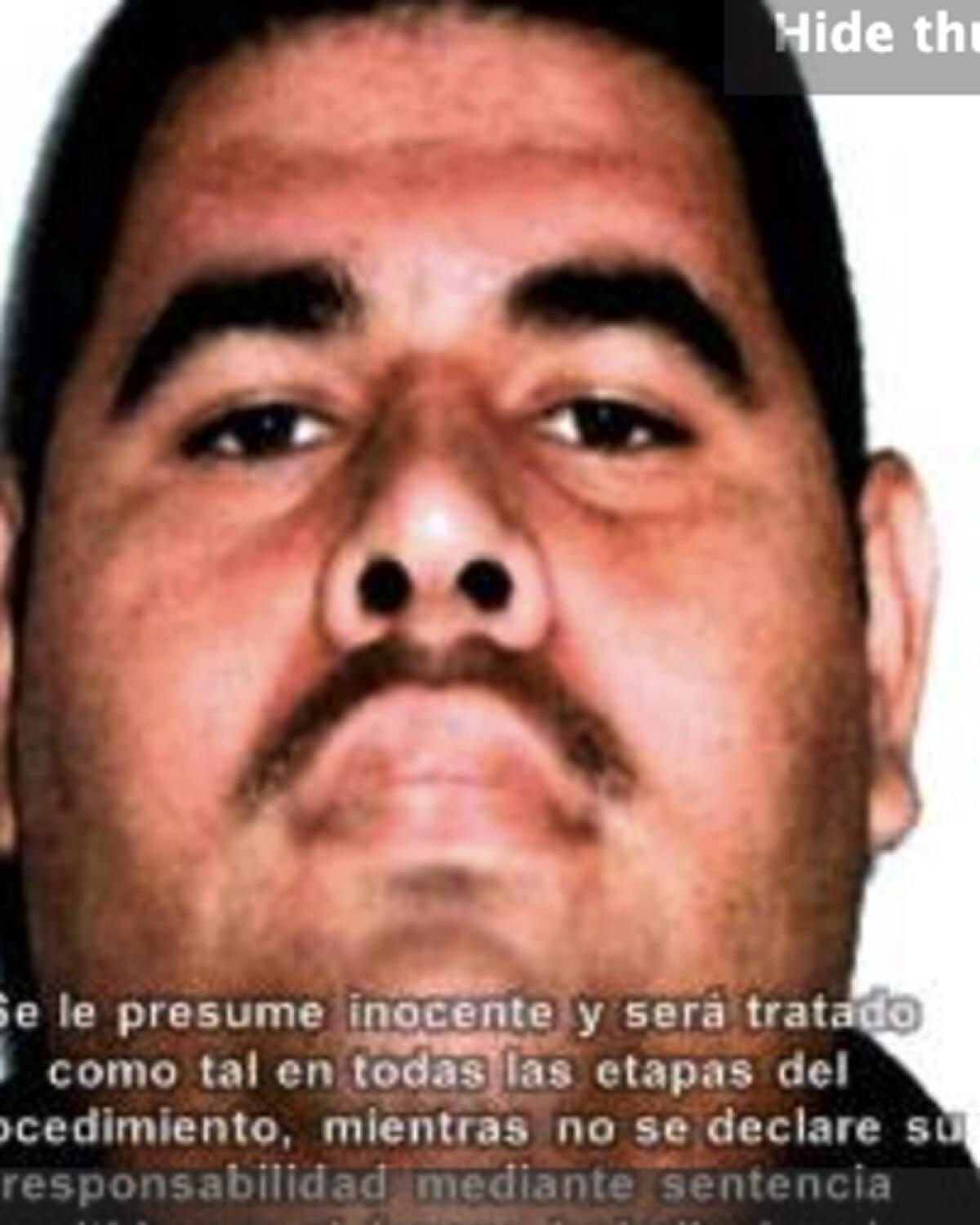Attorney who laundered millions for Mexico’s Sinaloa cartel sentenced to 15 years in prison

Juan Manuel Álvarez Inzunza thanked U.S. authorities for arresting him and putting an end to his criminal career.
SAN DIEGO — Despite growing up poor in the stronghold city of the Sinaloa cartel, Juan Manuel Álvarez Inzunza overcame a difficult childhood and earned a law degree, even leaving his hometown for a time to avoid the drug violence that hung over the region.
But roughly a decade ago, a cartel figure entered Álvarez Inzunza’s private civil law practice in Mexico. “The wrong client came in, and he listened to them,” his attorney said Friday during a sentencing hearing.
That launched Álvarez Inzunza’s own criminal career as a high-ranking money launderer who cleaned millions of dollars in drug proceeds for the violent organization.

Álvarez Inzunza, 40, told U.S. District Judge Dana Sabraw that within months, his earnings from working with the cartel allowed him to send his children to private schools and take his family on vacations. But he said Friday he was “deeply remorseful” and thanked the U.S. government for capturing him, saying his 2016 arrest put a quick end to his criminal career and helped make sure “my conduct didn’t get any worse.”
Sabraw sentenced Álvarez Inzunza on Friday in San Diego federal court to 15 years and eight months in federal prison, acknowledging the defendant’s expressed remorse and acceptance of guilt, but noting his crimes were “very significant” and part of a “longstanding conspiracy” to launder money for “a very violent organization.”
The Sinaloa cartel “[doesn’t] exist without money,” Sabraw told him. “You’re complicit in all of this activity — it’s not just the money laundering.”
In a news release, prosecutors said Álvarez Inzunza “regularly received requests” to arrange the collection of drug proceeds in the U.S. that originated “from the top leadership of the cartel — including Ismael ‘El Mayo’ Zambada and Joaquin ‘Chapo’ Guzmán.”
The judge told Álvarez Inzunza that as a lawyer, he had a skill set that should have allowed him to earn money and provide for his family by legitimate and honorable means, but instead his actions were the “complete antithesis.”
According to his attorney, Álvarez Inzunza — nicknamed “El Rey Midas” after the mythical Greek king who could turn everything he touched into gold — engaged in criminal activity “while trying to provide for his family,” but ended up doing the opposite and “destroying his family.”
Defense attorney Frederick Carroll said his client’s parents died when he was young, so he was raised — and often neglected — by relatives who worked on farms in Culiacán, the capital of the Mexican state of Sinaloa. He at one point “somewhat tragically and ironically” moved away from Culiacán to avoid the cartel, only to become involved in it later.
“A series of small decisions to work with these people ultimately resulted in a situation where he could not extricate himself from his newfound employ — a situation he deeply regrets now,” Carroll wrote in a sentencing memorandum.
As part of his plea agreement, Álvarez Inzunza admitted that he laundered money for the cartel from at least December 2013 to August 2015.
Prosecutors wrote in a sentencing memorandum that Álvarez Inzunza was the lead defendant in a long-running cartel money-laundering investigation that used wiretaps to intercept Blackberry messages. From those messages, federal agents determined Álvarez Inzunza was organizing the transfer of millions of dollars in drug proceeds from the U.S. to Mexico, Colombia and other nations.
“Agents used these intercepted messages to seize at least $3.5 million in bulk currency before it left the country, and other intercepts showed [Álvarez Inzunza] orchestrating the transfer of millions more,” Assistant U.S. Attorney Daniel Zipp wrote in the sentencing document.
Zipp said in court Friday that the messages also showed the defendant orchestrated small-scale drug-smuggling operations across the U.S.-Mexico border.
“This defendant is nothing like” the low-level drug couriers often charged in U.S. District Court, Zipp argued Friday. “He is multiple layers above the typical drug courier ... at the higher levels of [the] cartel.”
Zipp said authorities still don’t fully understand all the ways Álvarez Inzunza was able to move money out of the U.S., but said he used “several layers of subcontractors.” In court and in the sentencing document, the prosecutor said that from his home base in Culiacán, the defendant would receive orders from high-level cartel bosses, and then relay the orders to an associate in Colombia. That associate would then coordinate for lower-level couriers in the U.S. to pick up large amounts of cash.
Intercepted messages led federal agents in late 2013 to pick off $250,000 in drug proceeds in New York, according to court documents. Two months later agents seized another $425,000 in New York and Boston, and a few months later seized $400,000 in Detroit.
Zipp told Sabraw that Álvarez Inzunza was the leader of his particular laundering cell.
A San Diego grand jury handed down an indictment against Álvarez Inzunza and the other members of that network in 2015, and Mexican authorities arrested him at the request of U.S. officials in March 2016 in Oaxaca. He remained in Mexican custody until his extradition to San Diego in June 2021.
U.S. officials said that in 2016, Álvarez Inzunza and two businesses he controlled — a tuna fishing company and a money services business — were designated under the Foreign Narcotics Kingpin Designation Act. That designation prohibits U.S.-based entities or individuals from conducting business with him or his companies.
Zipp requested Sabraw sentence the defendant to 20 years in prison, while Carroll asked that his client be sentenced to about eight years — the same sentence given to Álvarez Inzunza’s Colombian associate, Ivan Alfredo Castro Santana.
Álvarez Inzunza is likely to receive credit for the time he has already spent in custody, meaning he’s likely to serve about nine more years in federal custody, and then will be deported back to Mexico upon his release.
More to Read
Sign up for Essential California
The most important California stories and recommendations in your inbox every morning.
You may occasionally receive promotional content from the Los Angeles Times.











